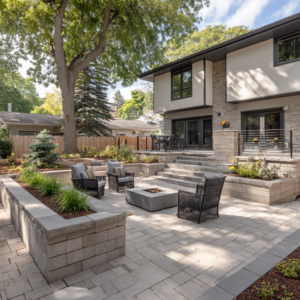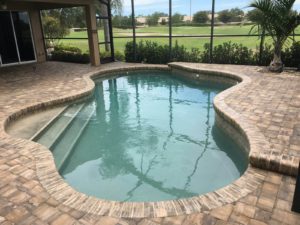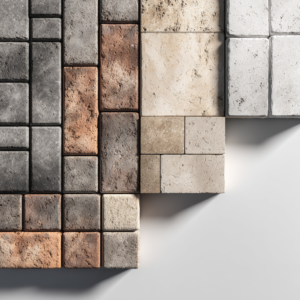Porcelain pavers have gained immense popularity in the world of outdoor flooring. These versatile and durable alternatives to traditional pavers offer a range of benefits. However, like any other material, porcelain pavers also have their drawbacks. But what exactly are the pros and cons of porcelain pavers?
Compared to other popular choices, like concrete and natural stone pavers, porcelain pavers are not very well known. In fact, many people even get surprised when they hear about them for the first time.
Therefore, the goal of this article is to delve into the pros and cons of porcelain pavers, so you can get to know them and help make an informed decision when considering them for your outdoor space. So let’s explore the pros and cons of porcelain pavers.
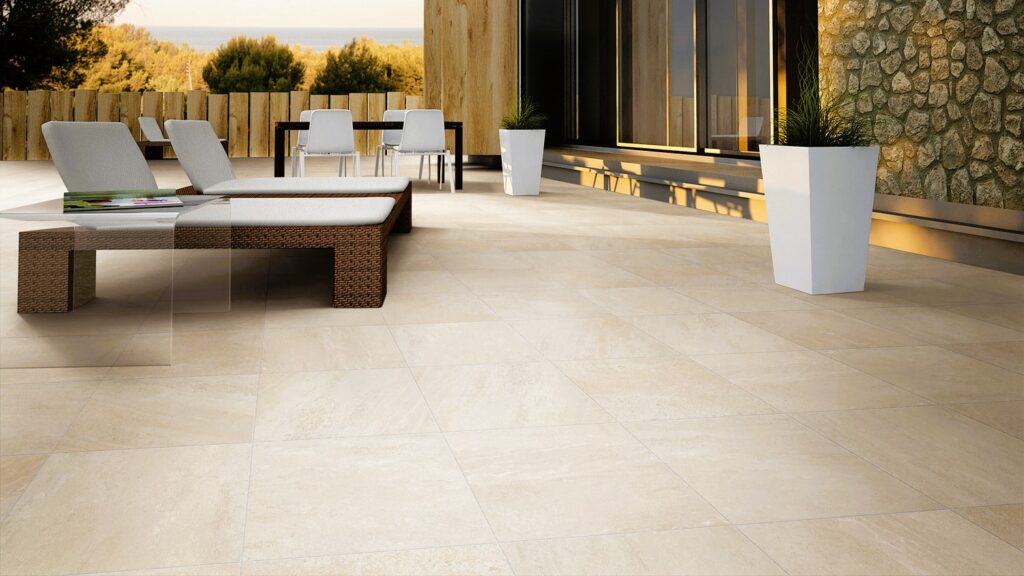
Jump to:
Pros and Cons of Porcelain Pavers
Porcelain pavers have a very interesting, and somewhat surprising, list of pros and cons. We are going to talk about each topic in detail, but let’s present you with a quick list just to have an idea:
Pros
- Durability
- Low maintenance
- Versatility
- Slip resistance
- Environmental Friendliness
Cons
- Cost
- Installation challenges
- Weight
- Heat absorption
- Limited repair options
Read as well: Porcelain vs Concrete Pavers – The Final Battle
Pros of Porcelain Pavers
Durability
Porcelain pavers possess remarkable durability, making them a superior choice for various applications. Their exceptional resistance to cracking, fading, and staining sets them apart, rendering them suitable for both indoor and outdoor areas exposed to harsh weather conditions.
The durability of porcelain pavers can be attributed to their manufacturing process. They are made by compressing and firing a mixture of fine clay, minerals, and pigments at extremely high temperatures.
This high-temperature firing process results in a dense, non-porous material that is highly resistant to moisture penetration, freeze-thaw cycles, and the effects of UV radiation.
Their resistance to cracking is particularly noteworthy. Porcelain pavers have a low porosity rate, meaning they absorb minimal amounts of water.
This quality prevents the pavers from expanding and contracting significantly when exposed to temperature fluctuations, reducing the likelihood of cracks developing over time. This makes porcelain pavers an excellent choice for regions with extreme weather conditions, where other materials may be prone to cracking.
The durability of porcelain pavers also applies to their aesthetic aspect. Their color and design remain vibrant and fade-resistant even after prolonged exposure to sunlight. This resistance to fading ensures that the pavers retain their aesthetic appeal over the long term, making them an ideal option for outdoor areas that require visual consistency.
Porcelain pavers are also highly resistant to stains, making them suitable for areas prone to spills, such as patios, pool decks, and dining areas.
The non-porous nature of porcelain prevents liquids from seeping into the material, reducing the likelihood of permanent stains. Additionally, their smooth surface makes them easy to clean, requiring minimal effort to maintain their pristine appearance.
Another advantage of porcelain pavers is their ability to withstand heavy foot traffic without showing signs of wear and tear. They are highly resistant to scratches and abrasions, ensuring that even high-traffic areas such as walkways, driveways, and commercial spaces maintain their durability and visual appeal.
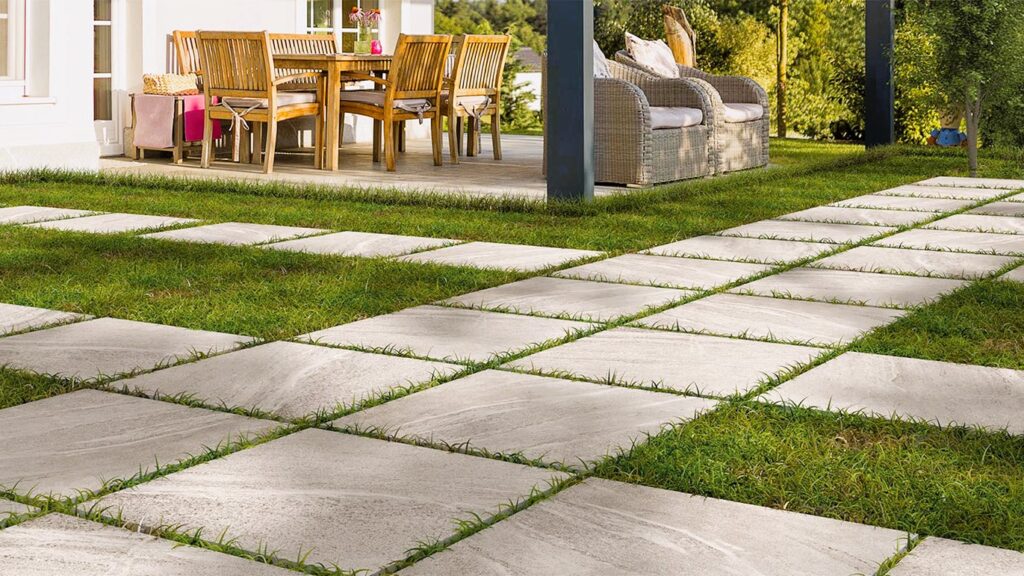
Low Maintenance
One of the most compelling advantages of porcelain pavers is their exceptionally low-maintenance requirements.
This low maintenance aspect translates into time and cost savings for homeowners and property owners. Unlike natural stone pavers, for example, porcelain pavers do not require sealing or special treatments to maintain their appearance and durability. Regular maintenance for porcelain pavers is relatively straightforward, which is always an extra when it comes to hardscaping products.
Sweeping the surface regularly helps prevent the buildup of dirt, debris, and leaves, ensuring that the pavers remain visually appealing. In cases where more thorough cleaning is necessary, a simple washing with mild soap and water is usually sufficient to remove any stains or residue.
This ease of cleaning makes porcelain pavers an excellent choice for busy individuals or those who prefer to spend less time on upkeep.
The stain resistance and non-porosity of porcelain pavers that we mentioned earlier are particularly advantageous, as it eliminates the need for intensive cleaning or the use of harsh chemicals.
Spills and accidents are an inevitable part of outdoor living. With porcelain pavers, you can have peace of mind knowing that most stains can be easily wiped away without leaving a lasting mark. This attribute is especially beneficial for areas like outdoor dining spaces or pool decks, where spills are more likely to occur.
Versatility
The versatility of porcelain pavers extends beyond their exceptional durability and low maintenance. These pavers offer a vast array of design options, allowing you to customize your outdoor spaces according to your aesthetic preferences and design vision.
Porcelain pavers are available in a wide range of colors, enabling you to find the perfect hue to complement your outdoor environment. From warm earth tones to cool grays and vibrant blues, the color options are virtually limitless.
This variety makes it easier to achieve the desired ambiance for your outdoor space, whether you prefer a soothing and serene atmosphere or a bold and vibrant one.
In addition to colors, porcelain pavers offer an extensive selection of patterns and textures. The manufacturing process allows for the replication of various natural materials, including stone, wood, and concrete.
The wide range of colors, patterns, and textures available with porcelain pavers provides endless possibilities for creative expression and design flexibility. Whether you are looking to create a cohesive and harmonious outdoor space or to make a bold statement with contrasting elements, porcelain pavers can help you bring your vision to life.
Slip Resistance
When considering outdoor flooring options, safety is of paramount importance, especially in areas where moisture is present. Porcelain pavers excel in this regard – as they are designed with a textured surface that significantly enhances slip resistance, making them an excellent choice for various outdoor spaces.
The textured finish of porcelain pavers plays a crucial role in improving traction and reducing the risk of accidents, particularly in wet conditions. The surface texture creates friction between the pavers and footwear, providing better grip and stability.
This slip-resistant characteristic is particularly advantageous for areas surrounding pools, where water splashing and wet feet are common occurrences. The enhanced traction offered by porcelain pavers helps prevent slips and falls, providing peace of mind for homeowners and ensuring the safety of family and guests.
But this slip resistance of porcelain pavers is not limited to pool decks. They are equally suitable for patios, walkways, and other outdoor areas exposed to moisture, such as garden paths or outdoor showers.
Whether it’s from rain, sprinkler systems, or simply high humidity, these spaces can become hazardous when surfaces become slippery. By choosing porcelain pavers with their textured surface, you create a safer environment for everyone, minimizing the risk of accidents and injuries.
Environmental Friendliness
With all these advantages, it might be a little surprising that, on top of it, porcelain pavers are an exceptional environmentally friendly option. Nowadays, this factor is particularly praised.
These pavers are crafted from natural materials such as clay, sand, and minerals, which are readily available and have minimal impact on the environment during extraction. By utilizing sustainable practices throughout the manufacturing process, porcelain pavers further enhance their eco-friendly credentials.
They can be completely recycled, meaning that at the end of their lifespan, they can be broken down and used as raw materials for the production of new pavers. This closed-loop recycling system reduces the demand for new resources and minimizes waste generation, promoting a circular economy and sustainable construction practices.
Cons of Porcelain Pavers
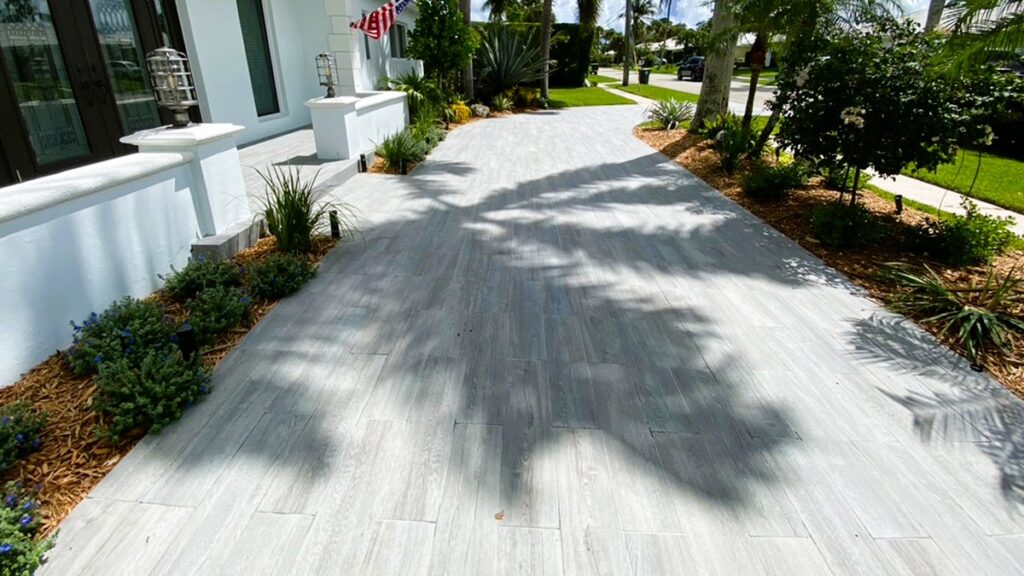
Cost
When talking about the pros and cons of porcelain pavers, the cost is always a controversial subject. One of the primary drawbacks of porcelain pavers is their comparatively higher cost in comparison to alternative outdoor flooring options.
The manufacturing process and the quality of such manmade material contribute to the elevated price tag associated with porcelain pavers. However, it is crucial to delve deeper into the reasons behind their higher initial investment and consider the long-term benefits and durability they provide.
Firstly, as mentioned, the manufacturing process of porcelain pavers involves advanced techniques and high-quality materials. Porcelain is a type of ceramic that is fired at extremely high temperatures, resulting in a dense and durable material.
The raw materials used in porcelain pavers, such as fine clays and minerals, undergo a meticulous production process, including shaping, pressing, and firing. This intricate manufacturing process ensures that porcelain pavers possess exceptional strength, resistance to wear and tear, and the ability to withstand harsh weather conditions.
Due to their exceptional durability, porcelain pavers offer long-term benefits that outweigh their higher initial cost. They are highly resistant to stains, scratches, fading, and even chemical damage.
Unlike other outdoor flooring options, porcelain pavers retain their color, texture, and overall appearance over time, with minimal maintenance required. This long-lasting quality eliminates the need for frequent replacements, saving both time and money in the future.
So, while porcelain pavers may have a higher initial cost compared to other outdoor flooring options, their long-term benefits and durability outweigh the investment, making them the most cost-effective choice in the long run.
Installation Challenges
Installing porcelain pavers can be much more complex and require specific considerations compared to traditional pavers.
The thickness of porcelain pavers necessitates careful preparation of the base and the use of specialized installation techniques. It is essential to highlight these factors to ensure a successful and long-lasting installation.
One of the key aspects to consider when installing porcelain pavers is the preparation of the sub-surface.
Unlike thicker traditional pavers, porcelain pavers require a well-leveled and stable base to ensure their integrity over time. Any unevenness or instability in the sub-surface can lead to the pavers cracking or shifting, compromising the overall installation.
Proper site preparation is crucial and may involve excavating the area, ensuring proper drainage, and compacting the soil or adding a suitable base material.
The installation of porcelain pavers may also require specialized tools and equipment. Since porcelain pavers are denser and harder than traditional pavers, cutting and shaping them may require diamond-bladed saws or wet tile saws.
These tools ensure precise cuts and prevent damage to the pavers during the installation process. It is advisable to hire professionals experienced in working with porcelain pavers to handle the installation, as they will have the necessary tools, knowledge, and expertise to ensure a successful outcome.
At the end of the day, hiring professionals for the installation of porcelain pavers is highly recommended – as any project involving porcelain pavers can quickly get out of hand for people who don’t have hardscape experience.
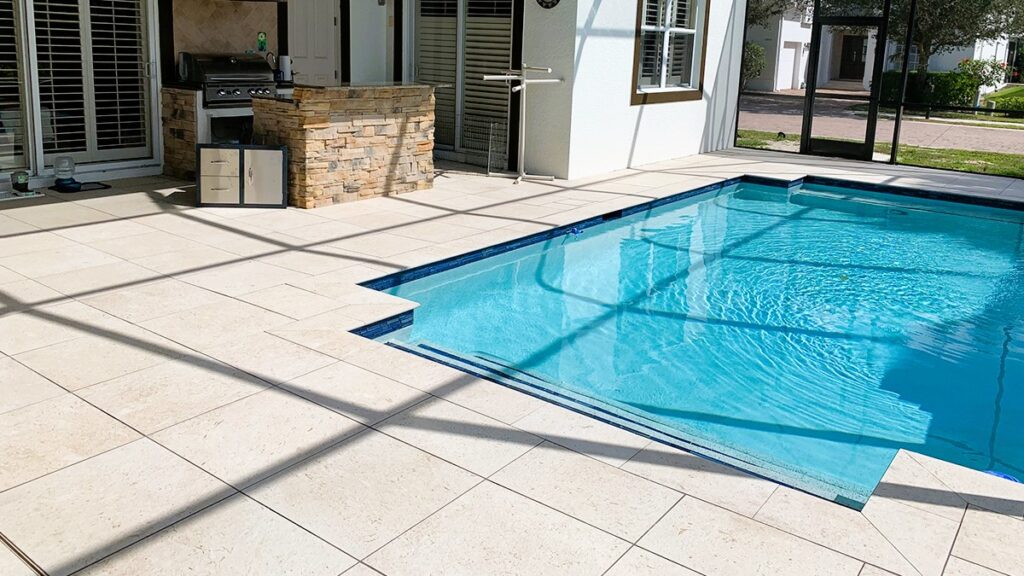
Weight
Porcelain pavers have a higher weight compared to other paver options, and this characteristic can present challenges during transportation, handling, and installation.
The weight of porcelain pavers can make the logistics of transportation and installation more demanding. Their heavier nature requires more labor and equipment to handle them effectively.
When moving large quantities of porcelain pavers, it may be necessary to use heavy-duty machinery such as forklifts, cranes, or pallet jacks to load and unload them safely. This adds an additional layer of complexity and cost to the project, particularly if the installation site is not easily accessible or has limited space.
The weight of porcelain pavers can also pose structural considerations, especially when installing them on an elevated deck or rooftop.
It is essential to ensure that the underlying structure can support the added load. Porcelain pavers can exert significant pressure on the substrate, and if the structure is not designed to bear this weight, it may lead to structural damage or compromise the safety and stability of the installation.
Consulting with a structural engineer or building professional is recommended to assess the load-bearing capacity of the deck or rooftop and determine if any reinforcement or modifications are necessary.
Heat absorption
It is important to consider the heat absorption properties of porcelain pavers, particularly in hot climates or areas exposed to direct sunlight.
Porcelain pavers have the potential to become hot to the touch, which can create discomfort for individuals walking barefoot on them. Understanding this aspect and taking appropriate measures to mitigate the heat is crucial for a pleasant outdoor experience.
Choosing lighter-colored porcelain pavers can help mitigate heat absorption to some extent. Lighter colors tend to reflect more sunlight, resulting in less heat retention compared to darker-colored pavers. While this may not completely eliminate heat absorption, it can contribute to a slightly cooler surface temperature.
Another effective approach is to incorporate shading solutions into the outdoor design. This can involve strategically placing umbrellas, pergolas, or other types of shade structures to create shaded areas over the porcelain pavers.
By blocking or reducing the direct sunlight, these shading solutions help prevent excessive heat buildup on the surface, making it more comfortable for people to walk on them barefoot.
Limited repair options
In addition to the previously discussed aspects, it is important to consider the repair and maintenance requirements of porcelain pavers. While porcelain pavers are known for their durability, accidents or damage can still occur over time.
However, repairing porcelain pavers can present a challenge due to the interlocking nature of their installation, which often requires the replacement of an entire section rather than individual pavers.
One of the main challenges with repairing porcelain pavers is the need to remove and replace a larger section of pavers instead of focusing on a single damaged piece.
This is because porcelain pavers are typically installed using an interlocking system that ensures stability and prevents individual pavers from shifting or becoming loose. This interlocking pattern provides strength and durability to the overall installation but makes it more difficult to replace a single paver without disturbing the surrounding pavers.
The need to replace larger sections of porcelain pavers can result in higher repair costs compared to other types of pavers that can be replaced individually. The cost of labor, materials, and potential disruption to the existing installation all contribute to the overall expense.
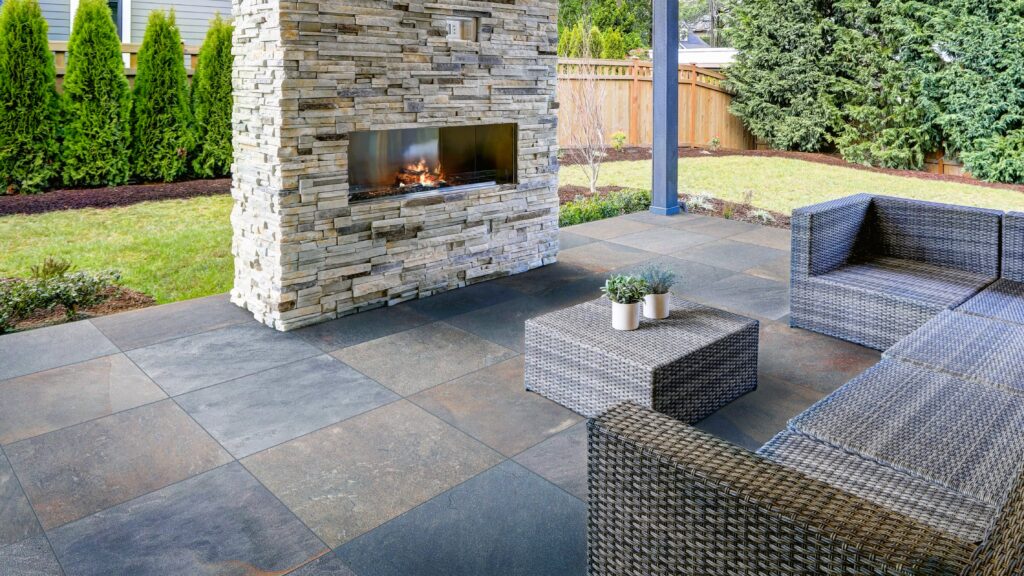
Start Your Project Today with JS Brick!
As you could see, there are many factors to consider when it comes to weighing the pros and cons of porcelain pavers. Even though it is currently one of the options of pavers available in the market, no aspect is trivial and everything must be carefully considered.
The safest course of action, as we mentioned previously, is to hire professional hardscape contractors to help you with your project. They can help you decide if porcelain pavers are the right choice for you and, if it is, help you with the installation, which requires expertise in hardscape.
We here at JS Brick have been working in the hardscape business for the past 23 years, so we know how tricky things can get when working with porcelain pavers. That’s why we always recommend working with professionals.
And if you happen to be around our area of service – Sarasota County, in FL – we can gladly provide that help for you. So get in contact right now for a free estimate on our services and start your project today!

